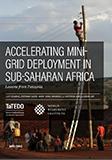Publications
Energy itself does not meet the needs of energy-poor households, businesses, and communities. Rather, it is the services that energy enables—such as lighting, telecommunications, refrigeration, cooking, transportation, and mechanization that transform lives and accomplish the goals of energy access. Yet billions of people today in developing countries (in both rural and urban areas) lack sufficient access to reliable, cost-effective modern energy services, which would help lift them out of poverty. The benefits of energy efficiency are well-documented in residential, commercial, industrial, and transportation sectors in developed economies, and theory and limited experience from the field suggest that efficiency is a first-order energy access resource. Wherever energy supply investments are needed, energy efficiency should reduce the amount of investment needed. Wherever existing supply resources fall short, or are unduly expensive on the margins, energy efficiency should (i) improve sectoral or system reliability and performance and (ii) mitigate marginal fuel or tariff costs. Unfortunately, energy efficiency is too rarely used as are source in energy access efforts, and there are important gaps in the research and techno-economic analysis needed to support its use.
The goal of this special feature is to highlight the role of energy efficiency as an energy access resource, along with providing an overview of opportunities where energy efficiency is supporting—and in many cases enabling significant energy access impacts.
Jordan, Matt; Corry, Jenny; Jaques, Ivan. 2017. Energy Efficiency: A Key Enabler for Energy Access. State of Electricity Access Report. Washington, D.C.: World Bank Group. http://documents.worldbank.org/curated/en/101411494930752208/Energy-efficiency-a-key-enabler-for-energy-access


